How to Make an Acting Resume With No Experience

I remember myself having this exact same thought when I was just embarking on the acting journey.
In reality, almost every single actor has been in a position of having an empty actor resume. We’ve all started out acting with no credits.
As a newcomer, you’ll have to get comfortable with the idea that you’re a fresh face on the block, you won’t be signed by any top talent agencies in Los Angeles (yet) and you’ll have to work with what you have.
Below, I will quickly walk you through what an actor resume is, what purpose does it serve, what resume you need for voice over jobs , the standards for an acting resume in Los Angeles, and the best way to go about writing your actor resume when you have no experience to list.
Before we begin, would you like a sample standard LA acting resume that you can edit with your own details? Share some social love and you can download an editable PDF.
- Download PDF: Acting Resume Sample (PDF)
Let’s start at the beginning. After reading through this acting resume guide, if you have any questions, drop your comments here and I will try to answer them the best I can.

What’s an acting resume, and why do you need one?
I’m sure everybody knows what a CV (curriculum vitae) is. It’s that piece of paper that people use to show to their potential employers.
Surprise surprise, an actor’s resume is the exact same thing that you use when they’re looking to book acting auditions in LA . It serves the same purpose, and is even structured similarly.
Alongside your headshot, an acting resume is one of the most important actor’s marketing tools that every aspiring thespian needs to have. It’s your calling card. You will list all of your acting experience, education, acting training and special skills that you have alongside your contact information, and a few physical stats.
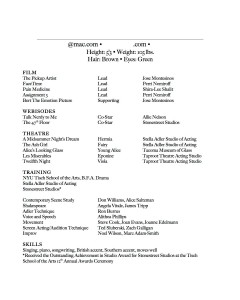
When you submit for an acting job, a CD will receive your full actor’s package: actor resume, headshot and, if you have it, your demo reel. The CD will look at your headshot first (!) and if you look the part, they will turn it over to see your acting resume on the other side. They’ll scan through your physical stats, your credits and, sometimes, your special skills if that applies.
Say your resume looks professional, your look fits the part, and the CD is happy with your experience and credits. In this case, you’re going to get a call about an audition. Congratulations! You just got your first audition. Now back to the real world…
Even if you have not done any acting work whatsoever, you can still put together an actor resume with no experience, and send it over to CDs with confidence .
Despite your worst delusional fears (we’ve all be there, trust me), nobody’s going to think of you poorly if you have little or no acting experience. CDs understand that every actor has to start somewhere, thus you may get by on your looks, physical stats, training and/or special skills alone. Most importantly, don’t get discouraged if you don’t. Simply move onto the next project.
Bottom Line : An acting resume is what every actor needs to put together as soon as they’ve decide to enter show business. It’s their calling card.
Basics of a professional actor resume
Even though you have no credits under your belt yet, you still want to keep your actor resume looking clean and professional. Here are some basics to go by when structuring an acting CV:
- An acting resume is ALWAYS only one sheet of paper. No exceptions.
- It must have enough white space to be read easily (hey, you’re perfect for it!)
- It should be sized to fit a 8×10 headshot so that you can staple it to the back.
- Use standard fonts such as Arial or Times New Roman.
- Do not cram the resume with too many things. Keep it simple and relevant.
- Do not use any colors. It’s just black and white, plus headings for sections.
- Never lie on your resume. You’ll be surprised how quickly that gets out .
“ DON’T lie on your résumé. Actors do this all the time and they always get caught. If you claim to have booked a guest star role on “NCIS,” it stands to reason you would have footage from the show on your reel. If you don’t, I’m going to ask why. And that’s where the lie will start to fall apart. ” – Secret Agent Man , Backstage.com
These are the primary “rules” for a professional looking acting resume. Follow them and you’ll be alright.
If you download the sample acting resume above , you’ll notice that it’s slightly different from the resume in the picture, but the difference is irrelevant. In fact, most casting directors prefer the simplicity because it’s easier to read and remember.
What matters the most in an acting resume is the basic information that’s easy to see: personal details at the top, followed by credits and then training. You can choose either format, just keep it clean and easy to read.
And now for the acting resume format technicalities. I suggest you opening that resume sample from above so that you understand better what’s what.
Bottom Line : Your acting resume should look clean, professional, adapted for quick reading, and with the most recent and most relevant credits.
Acting resume format
Your personal information . As you can see in the acting resume template I’ve linked to above, and the provided Los Angeles actor resume example, we’re supposed to start with some personal details. For the purpose of this article, let’s assume that you’re a non-union actor with no talent agent representation, which is most likely the case anyway.
- Actor’s name . This is where your stage name (not your legal name) goes. Simple.
- Union title. If you’re not affiliated with any actor’s union, then skip this part.
- Phone number . Always use the number by which you can be reached any time.
- Physical stats . Self-explanatory. NEVER put your age or date of birth on the resume.
After the basic personal information, we’re moving onto the credits and what acting experience you have.
Your acting experience. Normally, this is where you would list all your credits, from television to film to theater to new media. If you’re pursuing acting in Los Angeles, most of your work will be focused on Film/TV, thus one resume is usually enough. However, people in New York City, for example, will often have at least two actor resumes: one focused on screen work, one on stage work. If you don’t have much acting experience, then one acting CV will be enough.

- Film credits . In this section, start with the name of the show , followed by the type of role (NOT your character’s name; see below) you did, then production company and finally director’s name .

- Television credits . Similarly to film credits, start with the name of the show , then the type of role (different to film type roles; see below), followed by television network and the director’s name . The same applies to Web Series/Webisodes productions.

- Theater credits . Again, begin with the name of the production/play , followed by your role/character’s name (this time it’s the other way around), then the theater company’s name and the location of where the production took place.
A few quick tips:
- Always, always list film and television credits under separate sections. You’ll see some bad actor resume examples where they’re filled under “Film/TV.” DO NOT do this, because it will make your acting resume look very unprofessional. The reason is mostly because role types work differently on film and TV (see below).
- Once you get more experience under your belt, try to remove some of the older and/or less important stuff from the resume. Keeping it clean will make you look more professional. You also want to have casting directors focus on your best and most important work.
- You can list your credits any way you want. Some people list them chronologically, but I usually suggest listing your best work at the top so that it catches peoples’ attention.
- Never put extra/background work on your resume. The reason being is that extra work is not considered acting. Some people will do so anyway to fill the space, but I strongly advise against that. If you’re ever asked about that part, and you have to say that you were actually a background on the set, that will make you look very unprofessional.
- When listing theater credits, you don’t usually name the director. However, if the director’s name is really well-known, I would list that either alongside the theater company’s name, or instead of the location if you’re short for space (similar to Film/TV credit format).
Your training and education . In this section, list all the relevant acting training that you’ve had so far. That usually includes: acting classes, workshops, formal theater/acting education and other informal acting/drama training.
Begin by listing the name of your acting teacher (for private/group classes) or the institution where you’ve studied acting. Right next to it you’ll list what type of acting classes those were, which you’ll know after you’ve taken them. There’s too many for me to list, but the most common are Scene Study, Cold Reading, Audition Technique, Improv, and On-Camera Class. In the third column of this section, it’s the location.
Now in terms of what goes where vertically. Normally, you’ll have your formal and probably oldest acting education at the bottom, which is the college or drama school that you went to. Even if you think it’s the best type of training you have received, that’s usually not how casting directors and agents think.
Keep the classes that you’re currently taking at the very top of this section, and add “(ongoing)” right next to them. After that, list any other acting class or workshop that you’ve taken chronologically with the oldest class at the bottom of the list.
Your special skills . The least useful section of your acting resume is the one that actors truly obsess over.
You don’t have to, because agents rarely even look here, unless there’s something very specific that they want from an actor.
With that in mind, don’t over-complicate this part and list the things that you’re most proficient in.
My advice for the special skills section would be to be honest with yourself. If you’ve only strummed a guitar a few times in your life, don’t put Guitar on there. If you’ve played basketball in high school which was 10 years ago, don’t put Basketball in there. Also, don’t write down things like Running and Whistling, unless you’re a professional. The same goes for listing languages. Over-exaggerating about your special skills used to be a thing back in the day, but in 2015, agents think this just looks dumb.
Also, they will often test you , so you better be prepared:
“ I want all of you to look up the meaning of the word “fluent.” Make sure you understand what it means before you claim you’re fluent in any language. I’m fluent in three, and I always test actors when I see one of those languages listed on their résumé. Care to guess how many couldn’t respond to a simple question in the language they’re supposed to be fluent in? ” – Secret Agent Man , Backstage.com
As you can see, agents do care and they do their due diligence.
Bottom Line : Always stick to the standard actor resume format, and don’t reinvent the wheel. Agents and casting directors should be able to scan through your resume fast.
Film and TV role types
Let me give you quick breakdown of film and television role types. This is something every aspiring actor in Los Angeles has to know. You’ll be surprised how often you’ll soon be using these terms.
TV role types
- Series regular – Main character(s) on the show under contract for a certain period of time, usually for the duration of the whole show/season.
- Recurring – Second most important TV acting role type. These are usually signed to appear on the show on multiple episodes.
- Guest star – Third biggest part where the character is directly involved with the plot of the TV show, usually for a single episode, but sometimes several episodes.
- Co-star – A small speaking part that will only be involved in one episode for a small period of screen time.
- Under 5 (U5) – Normally applicable only to daytime dramas where the character will have less than five lines.
Film role types
- Lead – Protagonist. Main character of the story on whom the whole film is centered.
- Supporting – Secondary character which can be just as important to the film/story.
- Principal – A small part with spoken lines where the character will usually interact with one of the above characters for a short period, but doesn’t add much to the story.
- Featured – A non-speaking part where the character gets enough facetime. This is not the same as an Extra, but sometimes Extras are promoted to Featured roles.
And that wraps up the whole technical part of an actor’s resume. Please feel free to come back to this article when you’ll need help with structuring your actor resume format.
If you have no acting experience…

So here’s where you can start.
A) The first thing you may want to do is think about whether you definitely have no experience. Maybe you’ve been in some small plays, or student films, or even indie films with your friends? List them all! Anything where you have actually done acting can go on your resume, even if it’s a small part in a silly project.
B) The next step is obvious: you need to search for opportunities to act. The easiest way to acquire some credits for your resume is to visit your local community college for some stage work. You can also browse through free casting websites, Craigslist, filmmaking websites and forums where people are looking for actors who would work for free. If you’re willing to do some work for no reward, that means you’ll find opportunities faster.
C) The third thing you can do is produce something yourself. I’ve already talked about the importance for actors to create their own projects , and the earlier you start, the better. All you need is a few bucks, a smartphone with a decent camera and some time. You can gather up a couple of friends, write a screenplay for a short film, shoot it on your phone and put it up on YouTube. That’s your first credit.
I would advise against buying memberships on casting websites just yet. If this is your first time venturing into the world of performing arts, give it some time, and see if you even like the craft of acting before spending money.
You will be surprised how quickly your resume will start growing if you dedicate some time to this, and if you’re willing to work for free. There are a lot of opportunities out there, especially if you move to a big city such as Los Angeles, New York City, Atlanta, Vancouver in Canada or London in England. Once you start receiving some acting work, remove your older, “silly” credits and replace them with the most recent stuff.
Finally, try to have fun. People often forget about this – myself included – but it’s an integral part of succeeding as an actor. After all, don’t we all want to become actors so that we can have fun instead of work?
Related Posts

10 Top Talent Agencies in Los Angeles for Theatrical Representation

Where to Find Acting Auditions in Los Angeles

How to Get an Agent: The Ultimate Guide for Actors With Effective Strategies
Acting No Experience Resume Examples and Templates
Acting is a competitive industry, and breaking into acting when you have no experience is tough. You’ll need an acting resume to get started, but it isn’t easy to create an impressive resume when you don’t have any previous roles. Acting resumes shouldn’t contain any non-acting experience, so you may not have much you can use to fill up a page.
Fortunately, you can still land auditions when you have no acting experience. Everyone has to start from nothing. As long as you follow the standard acting resume format, attach a good headshot, and showcase the right skills, you can have your no-experience acting resume ready in no time.
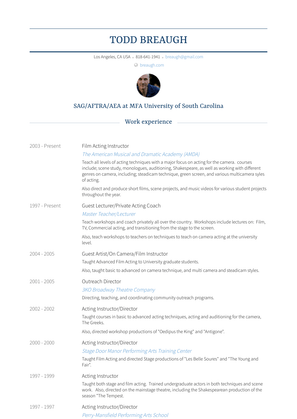
What is an acting resume?
An acting resume is a little different from a standard resume. In an acting resume, you list your acting credits and education only. You don’t include dates, job descriptions, or any experience unrelated to acting. You can include roles in film, television, theatre, and very little else.
Further, unlike in most resumes, your picture is one of the most important parts of your acting resume.
With most jobs, you would never include a picture with your application. When you are auditioning for acting roles, however, you won’t even be considered without a professional headshot. Casting directors will check your headshot first, then skim your resume to see previous roles and contact information.
Your specific skills and technical knowledge are not as important as your acting credits, your resume is less important than your headshot, and your headshot is less important than the audition. You still need a resume, but when you start auditioning for parts it’s important to make sure you have a professional headshot and real acting chops if you want to land a role.
How to write an acting resume with no experience
It’s difficult to write an acting resume with no experience, but every movie star had no credits when they first started out. As long as you have a great headshot and you follow the right acting resume format, you have a shot at landing your first role.
Here’s how to write an acting resume when you don’t have experience.
- 1. Find the right resume template
A great resume template can be a huge boost for your acting resume. Acting is a very visual profession, and you need to show that you have good taste, right from the beginning. An simple but eye-catching resume template will show the hiring manager or casting agent that you have personality, before they even meet you.
Traditionally, acting resume templates are basic in design. The more visual aspects will come from your headshot and, if applicable, demo reel.
At VisualCV, a template like Monte or Monaco would work great for acting resumes with no experience. They allow for simple formatting, tasteful white space, and are easy to keep to one page. You can even customize the text with some subtle colour that enhances the design.
These templates also allow you to include a photo, right on the page. While you will have to attach a separate headshot for most auditions, including an additional picture directly on the resume can be a great way to ensure the casting director doesn’t forget your face, even if your resume is mistakenly separated from your headshot. This is also a great way to fill up space on your resume when you don’t have many credits to your name.
One thing to keep in mind when selecting a template is that your acting resume should not be longer than one page. In some cases, you will have to attach your resume to the back of your standard 8 x 10 headshot, so any additional pages will be ignored. Make sure to choose a template that you can easily edit and customize to fit on a single page.
Once you’ve chosen the right acting resume template, you can get started writing your acting resume.
- 2. Include your personal details
The first thing you need to include in your acting resume is your contact information. The rest of your resume isn’t worth much if your contact information isn’t correct.
Include your name, phone number, email address, and city of residence.
If you have a professional online profile, you may want to include a link to it in your contact information section as well. A professional website, with your picture, credits, and a demo reel, can make you look like a credible working actor.
If you already have an agent or manager, you can include their contact information as well.
Many casting companies also require you to list your personal physical characteristics. List your height, weight, and eye colour on your resume. If you are underage you can also include your age, but exclude this detail if you are over 18.
In the past, it was common to list hair colour as well, but this is no longer necessary in the age of colour photography. The picture you include with your resume should make it clear what your hair looks like. Your full-size headshot should be attached to the back of your acting resume when you submit it for an audition, but you can also include a smaller one directly on the resume as well. This should help to take up space in your no-experience resume, and it helps ensure your face is closely associated with your resume at all times.
When you include a photograph, make sure it’s a professionally taken headshot that suits the requirements laid out in the casting call. Most casting directors have very specific guidelines about their submission process, so it’s important to get everything right. A selfie or a candid picture from your cousin’s wedding aren’t going to be good enough to include on your resume.
In some jurisdictions, you may also have to include your union membership or guild affiliation, like SAG or ACTRA. Add this to your personal details section.
- 3. Write an intriguing summary
In an acting resume, a Summary is optional. Your headshot and previous roles are generally the only summary a casting director will be looking for. If you have no experience, however, a brief summary can help capture their attention.
As an actor, you should love to be the centre of attention. Whether you’re up on the stage or starring in commercials, you must be able to thrive when there are lots of eyeballs pointed at you. This is a great asset when writing an acting resume with no experience.
In a resume, your Summary section is your elevator pitch to an employer. It’s where you can quickly list some highlights from your skill set and career to showcase what you are capable of. Located near the top of your resume, your Summary section should be attention-grabbing enough that it convinces the casting director to keep reading.
As an actor with no experience, your resume summary should highlight what will make you perfect for the role. This could mean mentioning your performing arts education, participation in acting workshops or seminars, or your experiences on set in a non-acting capacity.
- 4. Include any previous roles
Generally, a resume section listing your acting experience is a key part of an acting resume. If you have no acting experience, you may not have much to include in this section, but it’s still important to know the right format.
When listing previous experience, you can choose to list your roles in reverse-chronological order, with the most recent first, or in order of importance. Reverse-chronological resumes are more typical, but if you have one particularly impressive role you’d like to highlight, such as a starring role or experience with a well-respected director, you may want to list that one first so it can’t be missed.
When listing credits, you may want to create separate sections for stage productions, commercials, and television/film.
Listing film and television credits
For your film and television section, use three columns to list your roles. List the name of the production in the first column, the type of role you held in the second, and the production company and director in the third column. You don’t need to list the character name.
Film/Production title | Role type | Production company, director
Voice over roles can also be included. Voice acting is still acting.
Of course, if you have no acting experience, you won’t have roles in professional film or television productions. If this is the case, roles in student films and amateur productions are perfectly acceptable. In fact, acting in unpaid student films or online videos are great ways to gain experience.
Scene work from your acting classes and workshops can also be added here when you have no more substantial roles.
Listing theatre credits
For theatre roles, use three columns to list your roles. List the name of the show in the first column, your role in the second, and the names of the theatre company and director in the third. Here you can include school productions, community theatre productions, and broadway shows, as the case may be. Understudy credits are also acceptable here.
None of your theatre roles should include a date.
Show title | Character name | Theatre company/director
Listing commercial credits
If you have acted in commercials, you may want to include these in your resume as well. For commercials, you can list the ad agency in the first column, the role in the second column, and the production company and director in the third. You do not need to list the product that was being advertised, or the date the commercial was made.
What not to include
When you have no experience, you may not have any roles to list. If you have no roles in theatre, television, film, or commercials, don’t include that section in your resume.
You might be tempted to include your non-acting roles in the film or theatre industry in this resume section if you’ve worked as a member of the crew, but this isn’t necessary. While useful show-business experience, this isn’t acting experience. The Credits section of your resume should only include acting experience. If necessary, you could include a Related Experience section that includes some on-set roles, but only if you really have no acting experience to show.
Experience as an extra or background actor should be left off of your resume as well, unless these are your only roles. Acting in the background of a shot, when you have no lines, does not count as “acting” to a casting director.
Acting resume example: Previous roles
Short Films The Two Sams | Supporting | Toronto Fine Arts College, Samuel Smithe
Theatre A Midsummer Night's Dream | Puck | Theatre Acting Workshop, Toronto Fine Arts College Waiting for Godot | Vladimir (understudy) | Acting Workshop, Toronto Fine Arts College
- 5. Include your acting training and education
If you are writing an acting resume with no experience, your training and education section is one of the most important parts of your resume. Because you don’t have roles or work experience to showcase, your acting education is an important asset.
Your acting education might include an acting degree from a credentialed arts university. If this is the case, list the school, the name of your degree or diploma, and the dates you studied. In the description of your acting degree, you could include specific classes or specializations that you want to draw attention to. You may also want to note awards, related extracurriculars, or some of the school productions you were involved in. If you studied under a well-known acting professor, you may want to note their name as well.
You can also list individual acting classes, workshops, and seminars, as well as any other acting training you may have completed. While you might not have professional acting experience, your experience in acting school can be an important asset.
Scene Study | Sam Sanders | Scarborough Acting Studio Iprov | Singing Shrimp Improv School BFA, Acting | Toronto Fine Arts College, 2021
- 6. List your special skills
In an acting resume with no experience, your special skills are integral. Even if you don’t have experience, you might be the right person for a role if you have the right skills.
For an actor, special skills refers to performing abilities, like accents, language proficiency, dialects, musical ability, dancing, or level of fitness. You might not have acting experience, but the ability to speak another language, do a backflip, or sing classic broadway songs might be an asset for the specific role.
When listing your special skills, make sure they are all things you can do right on the spot. Don’t say you can imitate a Boston accent or do a handstand if you won’t be able to do it on demand, in the middle of an audition. Your special skills can be what get you a role, and failing to back up your claims can be what gets you rejected.
Special Skills
- Fluent in French
- Costume construction and cosplay
- 7. Consider optional sections
Once you’ve included all of the mandatory sections in your acting resume, you can consider some additional sections to fill out the page.
Experienced actors might include an Awards section, if they have received any accolades or recognition for their acting work. Even if you have no experience, you might have some awards from your acting school, student film festivals, or community theatre participation that you can include in this section.
You may also want to include a References section. This is rare, and most experienced actors will not include references, but if you have no experience and you still have space to fill on your one-page resume, including a short list of references is acceptable.
- 8. Attach your headshot
While all of the above is important, at the end of the day, you aren’t going to be cast if you aren’t right for the part, and casting directors won’t know if you’re right for the part if you don’t have a headshot. Make sure you have a professionally taken headshot that clearly shows your face. Traditionally, headshots are 8x10 inches, and stapled to the back of your resume in the top two corners. This makes it easy for casting directors to reference after you have auditioned.
In many ways, the headshot is actually more important than the resume. Casting directors are usually hunting for someone in the right demographic with the right look, so if you don’t fit the description, they won’t even read your resume.
If you have a demo reel, you may want to include this with your resume as well. Filmed evidence of your acting skills are a major asset, and is likely more impressive than your resume.
- 9. Customize your resume
It’s important to customize your resume for every application. In an acting resume, this means making sure the right credits and skills are emphasized.
If you are hoping to land a role in a comedy, make sure you mention your improv classes or stand-up comedy skills in your resume. If you are auditioning for a serious indie drama, mention your acting classes with a well-known drama teacher.
If you can highlight the skills and experience that are most relevant to the role, the casting director will be more likely to give you a chance.
Acting no experience resume example
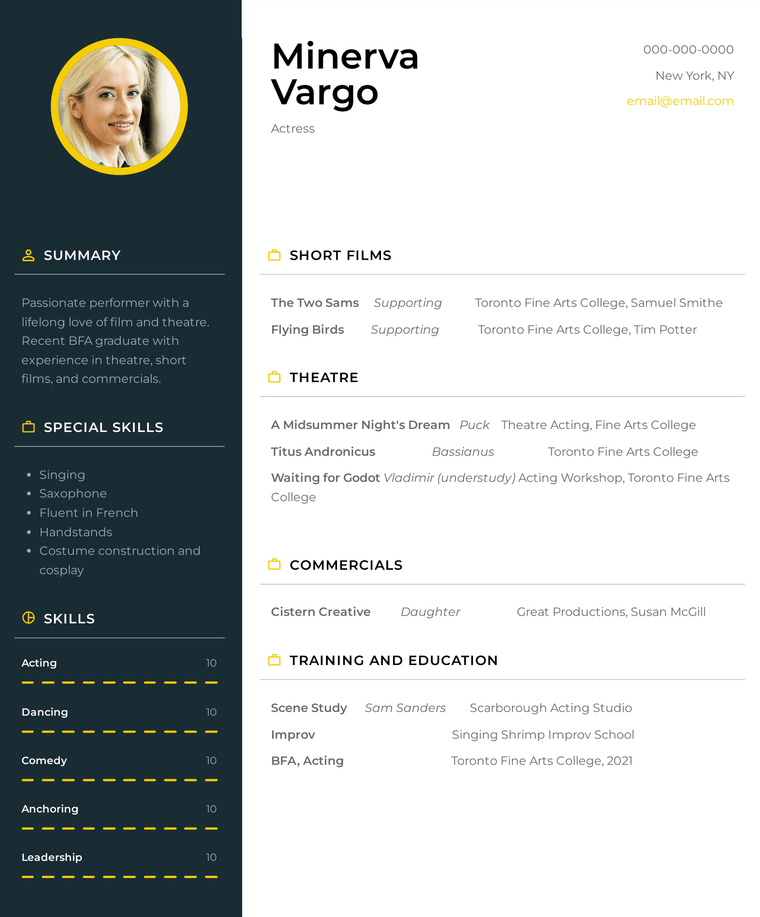
Copyright © 2024 Workstory Inc.
Select Your Language:
Acting Resume
How to make an acting resume.
Every resume has four sections: Personal and General Information, Credits, Training and Education and Special Skills. Below, you’ll see examples of what kind of information is needed in each section and the proper way to format it.
PERSONAL INFORMATION
Acting credits, television:, training and education, special skills.
Here’s another example: When I was finishing up my final audition for the film, Gods and Generals, Casting Director Joy Todd and director Ron Maxwell were looking at my resume. They didn’t think I was right for the role I had come in for but they saw that I did an Irish accent and asked if I could read a few lines. I did and got the part.
Download an Acting Resume Template Here
More acting resources.
| | | (Including and ) | | | | | |
1 thought on “Acting Resume”
Leave a reply cancel reply.
How to Make an Acting Resume With No Experience
- ')" data-event="social share" data-info="Pinterest" aria-label="Share on Pinterest">
- ')" data-event="social share" data-info="Reddit" aria-label="Share on Reddit">
- ')" data-event="social share" data-info="Flipboard" aria-label="Share on Flipboard">
How to Put Together an Acting Portfolio
Different fields of acting, what do theater actors make.
- Special Skills for an Acting Resume
- How to Hand in a Resume and Headshot at an Audition
Everyone has to start somewhere, and just because you don’t have acting experience, doesn’t mean you can’t create a winning acting resume. The key is to focus on the talents, traits and skills you do have and to emphasize what you can bring to the acting profession. Also give a nod to other professional experiences you've had in which acting-related skills, such as composure, attention to detail and focus are transferable.
Reference Any Experience
If you’re putting together an acting resume, chances are you have performed in some capacity in the past. Make note of it, no matter how small. Performances in school productions, community playhouse roles or even in neighborhood productions can all help highlight potential and ambition. Include any type of performance, not just acting. Anything that demonstrates your performance abilities and ease in front of a crowd can help promote your poise and stage presence qualities.
Highlight Your Skill Sets
Although actors, by their nature, must be quite versatile, many have personal areas of specialty in which they truly shine. Perhaps you can play a villain extremely well, can cry on command, are able to produce flawless accents or you speak another language fluently. Incorporate a "special talents" section into your resume and emphasize the unique elements that you can bring to an acting role. Consider adding a video component to an electronic resume, which enables you to highlight these traits.
Detail the Education and Training
Even if you haven’t done commercial acting in the past, when you list education and training on your resume, place an emphasis on what you've learned that will be helpful to landing a future acting role. For example, if you participated in an amateur improv group, attended a drama workshop or camp, use these important details to flesh out your resume. Make note of high-profile training or drama groups that were run by respected or well-known personalities in the entertainment world.
Describe the Creativity of Previous Employment
If you have other types of non-acting experience to put on your resume, highlight the creative aspects of those jobs, especially as you can relate them to acting. For example, if you worked in customer service, highlight your communication skills and your ability to get along with a diverse array of personality types. You want casting agents to see you as reliable, dependable, multi-talented and easy to work with.
Make the Most of Your Cover Letter
The cover letter that accompanies your resume is the place to highlight your passion, your drive and your dedication to succeed in an acting role. A well-written piece can help compensate for your lack of experience. Example :
Although I haven't yet had the opportunity to gain experience in front of the camera, I have extensive training in action films and period pieces. Additionally, I’m passionate about historic bio-pics, and I'm willing to work my way up with bit parts.
When you tailor your resume or cover letter to the specifics of the roles you’re seeking, you're more likely to catch a casting director's eye.
- Backstage: 8 Things to NOT Do With Your Acting Résumé
- Acting Plan: How to Make an Acting Resume With No Experience
Lisa McQuerrey has been an award-winning writer and author for more than 25 years. She specializes in business, finance, workplace/career and education. Publications she’s written for include Southwest Exchange and InBusiness Las Vegas.
Related Articles
How to write an acting resume with little experience, interview questions for an actor and model, examples of a cover letter for a theater audition, do you have to major in drama to be an actor, top 5 strategies to help in an acting interview, special talents to put on a model's resume, approximately how much money do starting models and actors make, steps on how to send a resume to an acting agency, how to become an actress if you have no experience, most popular.
- 1 How to Write an Acting Resume With Little Experience
- 2 Interview Questions for an Actor and Model
- 3 Examples of a Cover Letter for a Theater Audition
- 4 Do You Have to Major in Drama To Be an Actor?
How to Write an Acting Resume With No Experience
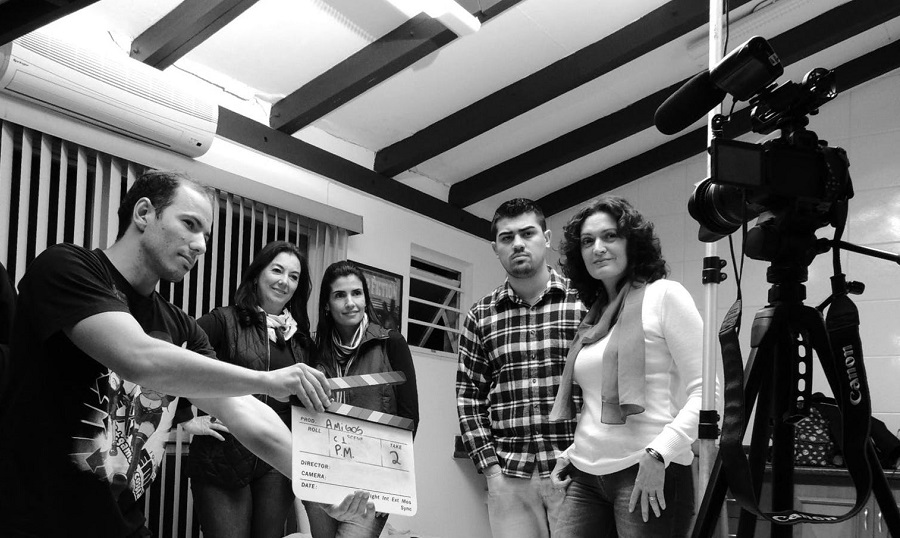
An ideal acting resume template starts with ordinary things. You tell some good stuff about yourself pointing at your uniqueness and abilities to do something different. Then you slightly go to the experience of performing or film acting and add a set of skills that might be very helpful.
However, most actors underestimate the resume value. They don’t think about it as about calling cards, which makes an audition or completely fails a try.
How not become overwhelmed while processing the information? How to focus on important details to be interesting and smart on paper?
Here are a few useful tricks from our actor resume writing service experts to make your next performance a big break in your career!
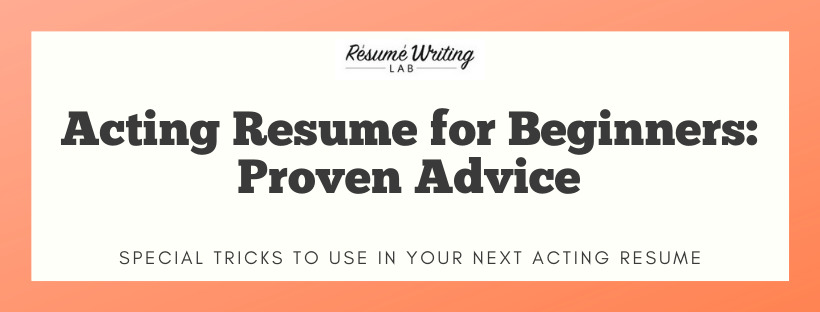
First, never make it big. Can you imagine directors reading huge stories about all candidates? 1 sheet of paper is enough to make an acting resume – no experience doesn’t mean the absence of parts.
Besides, good people may have a few courses behind. Even if they haven’t embraced themselves as actors, allows them to play unbelievably great.
How to Make an Acting Resume Format Better?
- Stick to the standard fonts, like Times New Roman or Arial, crazy fonts sound so unprofessional in the last 10 years;
- Use an idea of differently colored headings (like TV, Theater, Skills, etc.), but remember to leave a lot of white space, so the document remains easy to read.
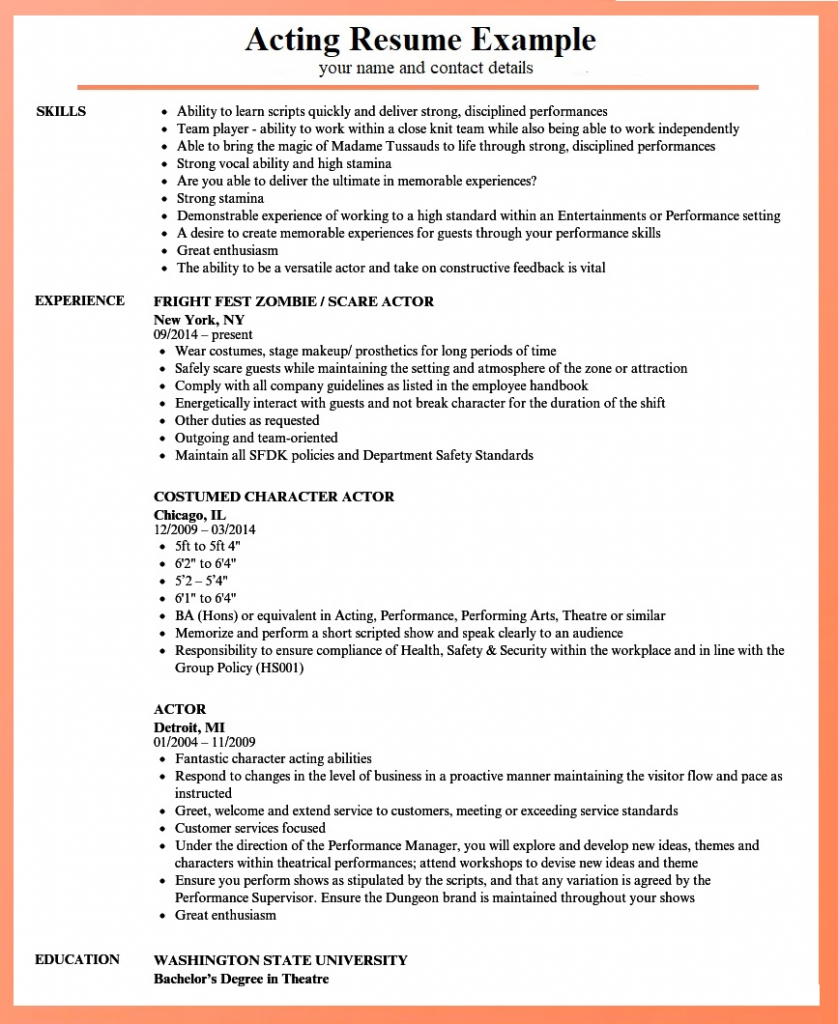
Ways to stand out in the acting resume with no experience are a demo reel, YouTube channel, etc. In other words show them any projects you’ve been holding on your own, like a blog or Instagram page. In that way, the agency you’re applying with will be able to reference you on something and make a resume just great for a position.
About height and weight – it’s okay to feel uncomfortable about that. Some actors recommend using a “Statistics Box” right after your contacts to focus a reader on your physical proportions.
You also can write a jacket size, by the way, to skip a part with numbers. Pick up an acting resume sample online to organize it as you like.
People struggling with how to write an acting resume don’t often give a shot to the other personal features, like hair and eye color or voice range if you’re able to sing.
The purpose of resumes in such a dynamic workspace is to be exactly the prototype casting directors are looking for. Don’t feel embarrassed to put these basic physical details making it easier for everyone.
Talking about a film acting resume, there’s a high demand for people who can do various things. Look at a list of 10 top skills that make you a better actor:
- Doing dialects – you’ll be of utmost importance with this one. British, Brooklyn, or some of the European countries – there’s so much stuff to learn about and get the dream role. However, use only a definite accent for the role, don’t just make another list of one point;
- Sports – start from a basic level of fitness. You may be required to work physically, and lose or gain weight in the short term, so show control over your body and don’t forget to list any gymnastics, circus techniques, or aerobics, you’ve done before;
- Music-related – dancing, singing, and playing instruments are always among acting resume special skills. You can point it out in the Introduction Letter;
- Combat training – well, don’t underrate it. Anything related to or describing stage combat (daggers, fencing, and swords), martial arts, or having general weapons experience is very helpful;
- Improvisation – clearly, the best expertise, which is hard to get by the way. Whenever you decide to list an “improve” skill, treat it very seriously and prove it with some additional courses, if you can;
- Horseback riding – for the last time, don’t hesitate to write, even if there are no such scenes in a movie or theater performance. With a good agency, special skills for acting resume are highly appreciated, and you’ll get the appropriate audition first;
- Stunts – we haven’t forgotten about sky diving, cycling spills, mountain biking, etc. Save time for a stuntman, the acting thing is about everything you can do now and you’re capable to learn fast;
- Driving – how many in-car scenes have you seen? How many actors used to drive on set? It’s no big deal, but can make you look professional;
- Comedians – a lot of casting directors confess it gives the candidate a different shade;
- Just something “unique” – these are the actual words of a casting director. Think deeper about a role. Maybe you’ve done something related, maybe you got a job that is non-acting and still helpful to understand your character.
Think carefully about your expertise and never lie. Use some additional skills to describe your personality . True professionals will find out.
Also, it’s great to have someone sign the Letter of Recommendation for you, to justify any of the skills or training you got and mention a few words regarding your personality.
There’s a detail left for a professional acting resume – the projects you’ve been working with. There are 4 main sections to pay attention to:
- Television;
- Commercials;
Here’s an acting resume example of listing filming expertise:
Name of the Film → Production Company or Director (or both, it’s even better!) → Role (lead, supporting, etc.) or Name of the Character
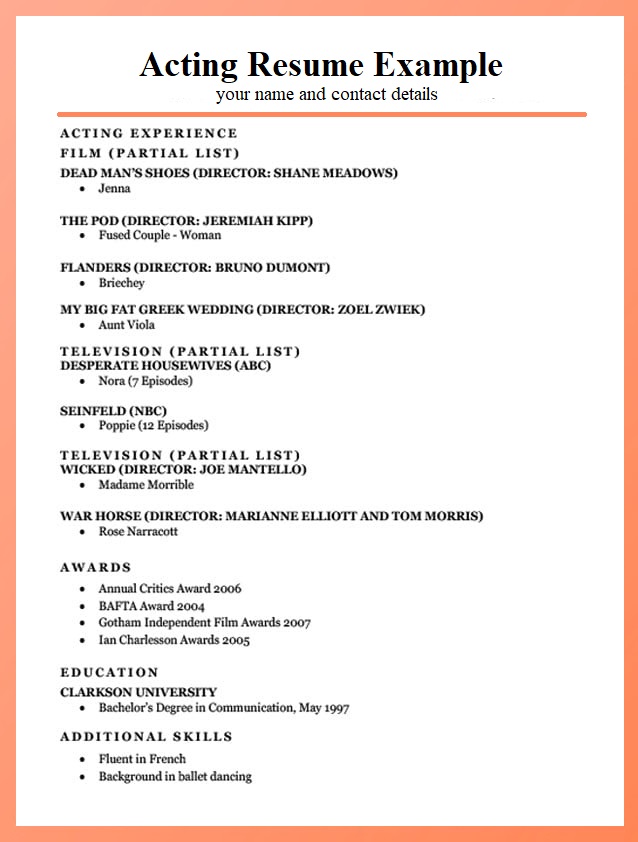
You may use the same scheme regards television or theater projects with one exception –be shy about telling about a school theater. It’s also an important experience to share.
Commercials are different. They’re not always necessary. So, just add “available upon request”.
So, take time to work on resume formatting and make it as good as you’re on stage. Don’t ever lose a chance to show your talent and get maybe the next big breakthrough in your whole career. Be respectful to casting directors and eager to get an audition.

Acting Resume Example & Writing Guide
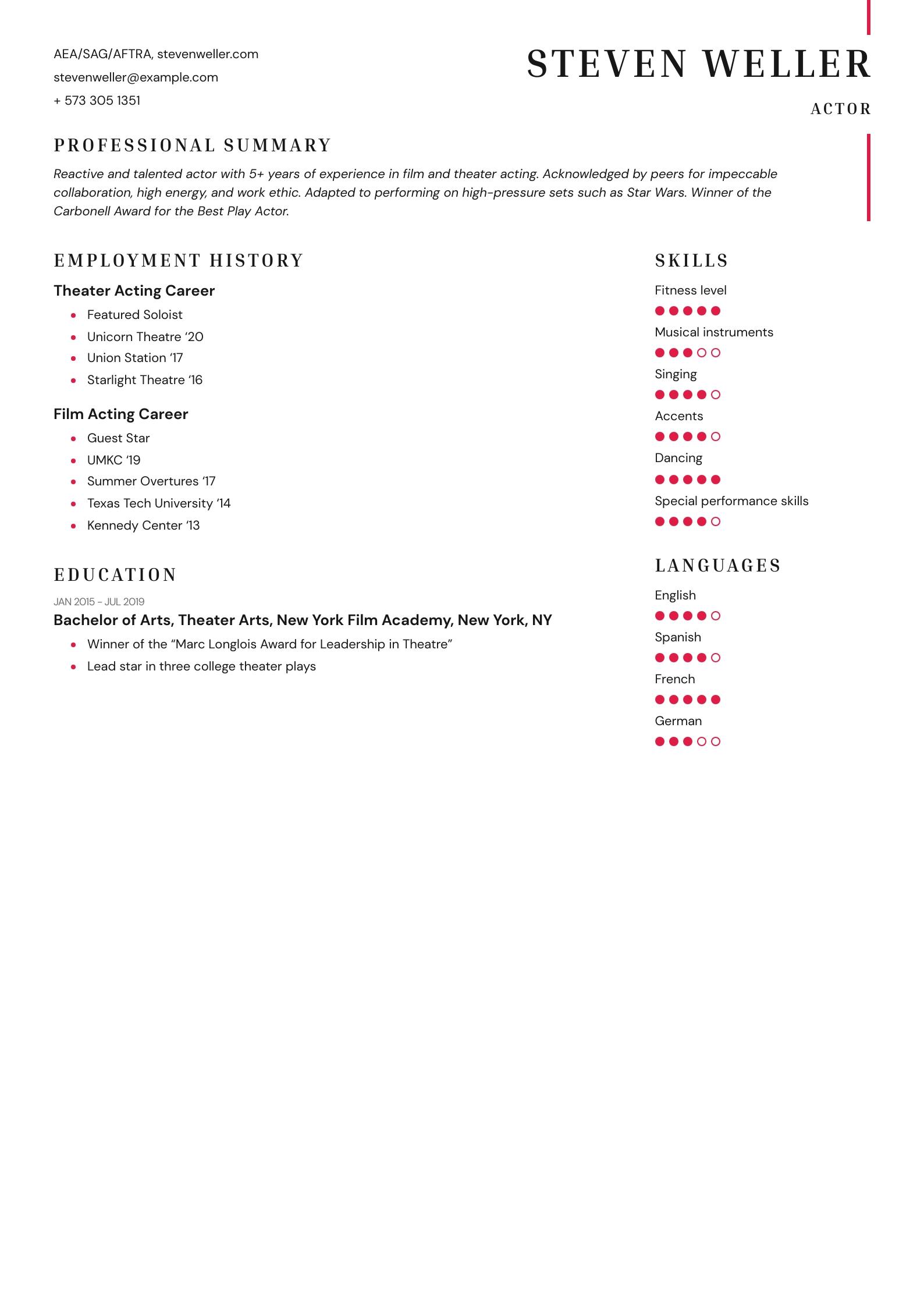
Your acting skills are top-tier, and that role that you’ve been eyeing out seems perfectly tailored for you. Now all you need is an enchanting acting resume.
But how do you put all your skills and experience on paper? How do you convey to the recruiter that you have all that it takes to ace the part?
Well, this is where we step in with this detailed guide! You’ll get not only specific explanations on how to write every single section of an acting resume but also some real-life examples and expert tips. Without further ado, let’s jump in!
Key Takeaways
You should tailor your work experience section to the role you’re applying for (e.g., put theater roles first if you’re going for that one).
For best results, have your headshot taken by a professional photographer before attaching it to the back of your resume.
Your education is important, but if you don’t have a formal degree, you can make up for it by adding relevant seminars, masterclasses, workshops, private coaching , etc.
In addition to listing your skills in a separate section, mention the most important ones in other parts of your resume .
What is the Right Format to Use for an Acting Resume?
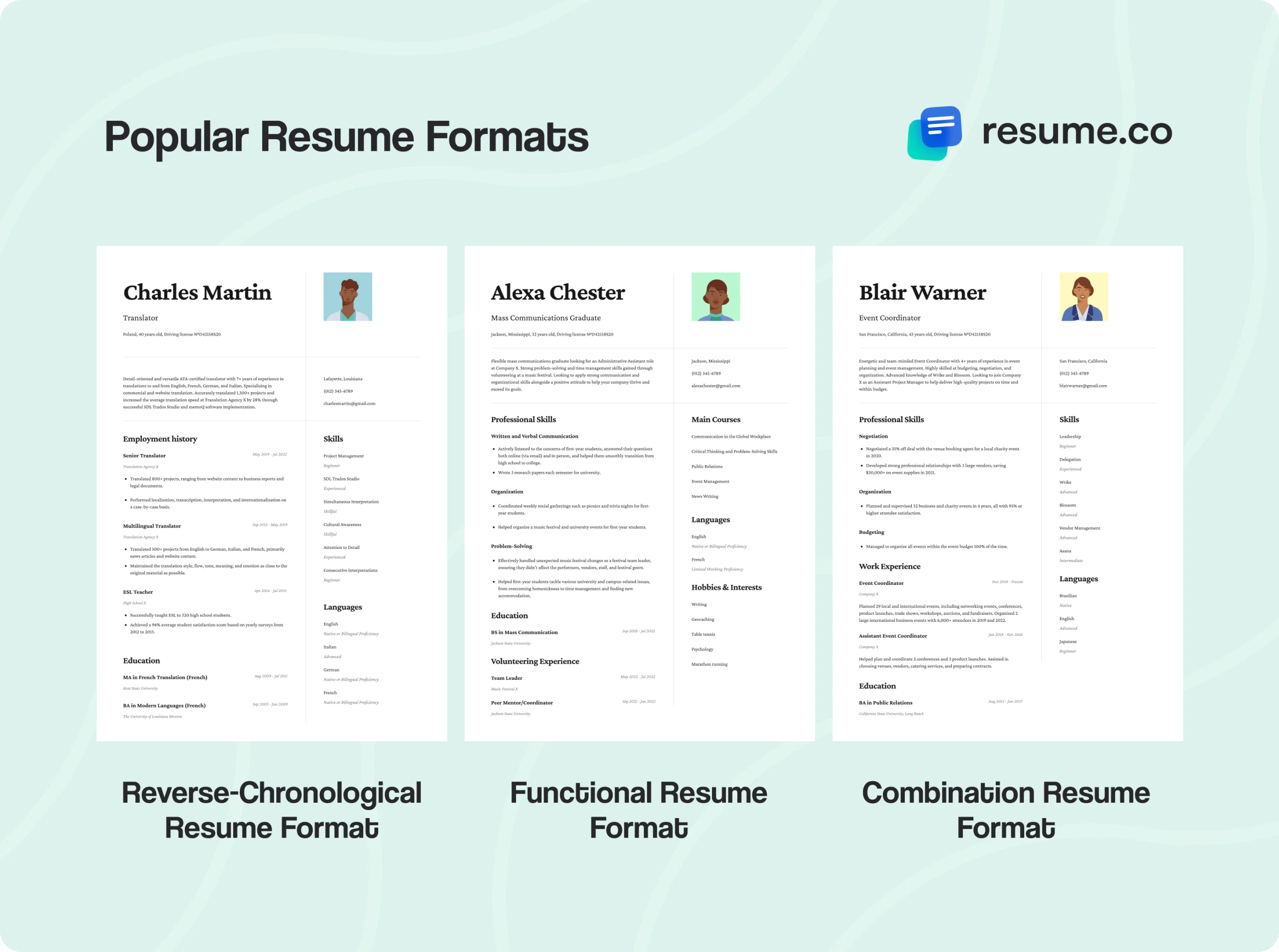
Broadly speaking, there are three resume formats that are used more than most and that have been proven over time to yield the best results with recruiters. They are:
Popular Resume Formats
Chronological , which puts your accomplishments in reverse-chronological order, starting with the latest ones.
Functional , which is perfect for entry-level candidates as it emphasizes skills over experience.
Combination , which is perfect for senior candidates. It combines the chronological and functional to highlight skills and make them more concrete with relevant achievements.
In general, the vast majority of candidates in various fields often see the best results with both recruiters and the ATS by using the chronological format.
However, an acting resume format is unique in the sense that you usually can’t just pick one approach and go with it all the way.
For example, you could list multiple degrees using the principles of the chronological format, but when you’re making a work experience section, you might use a different method.
We’ll go into the specifics for all these sections, so keep reading to find out how to get the most out of every part of your acting resume.
Resume templates
Resume layout.
A resume layout is a fancy way of describing the appearance of your resume.
For optimal results, you should keep your resume to one page . To achieve that while still conveying enough information, consider these guidelines:
Resume Layout Guidelines
Bulleted lists are much more concise than blocks of text.
One-inch margins on all sides and enough space between sections help improve readability.
A resume-friendly font such as Arial, Calibri, or Helvetica will make your document look clean and professional.
You want to create a font size hierarchy and emphasize important elements, so you should use a 10–12 pt font size for the body and a 14–16 pt font size for section headings.
What Sections Should an Acting Resume Contain?
Mandatory sections.
Every acting resume should feature these sections:
Contact information
Resume objective/summary
Credits/Work experience
Optional Sections
Of course, you can always spice up your resume by adding optional details such as:
Now, we know that writing a resume can be daunting—especially if it’s your first time doing it. That’s why we’ve created an acting resume builder to help you out.
It’s a piece of software that will do all the resume-crafting hard work for you—from creating a professional layout to choosing a font or color. Your job is to simply fill in the blanks with your information, and you could have a finished acting resume in minutes!
Acting Resume Template
Here’s a clean and eye-catching acting resume template made using our resume builder:
Name and Surname
Phone number: 000-000-0000 | Email: [email protected] | Location: City, State
[Adjective] [your job title] with [years of experience, if applicable] in [your area of expertise, if applicable] looking for a [position] job at [company name]. Eager to apply [relevant skills] gained through [work/volunteer/other experience] to help [company name] [mention what you can do for the company].
Work Experience
Most Recent/Current Job Title Company City, State [Start date] — [End date]
For recent jobs, use 5-6 bullet points to list your top achievements and responsibilities
Use action verbs to make your responsibilities and achievements stand out
Add numbers to quantify your achievements
Previous Job Title Company City, State [Start date] — [End date]
Oldest Job Title Company City, State [Start date] — [End date]
For older jobs, use 2-3 bullet points to list your top achievements and responsibilities
[Degree] in [Major] [University/college name] [Start date] - [Graduation date]
Soft Skills
Hard Skills
Additional Sections
Add any relevant additional sections (languages, licenses, publications, hobbies, etc.)
Acting Resume Contact Information
This is the section that lets recruiters contact you should you get the job, which makes it crucial. You should put your contact details in the header of your resume and include your name, phone number, email address, and (optionally) website .
Additionally, you should include your height, weight, hair color, and eye color , as well as your vocal type if you sing.
Lastly, if you have any union affiliations , this would be the perfect time to mention them. If not, simply write “Non-Union.”
Here’s what that looks like:

Contact Information Example
Steven Weller
+ 573 305 1351
stevenweller.com
AEA/SAG/AFTRA
Height: 6’0
Weight: 170
Hair Color: Brown
Eye Color: Blue
Voice Type: Tenor
If you have an agent , start with “Represented by” and follow up with their details. In that case, you could omit your contact information.
Acting Resume Objective or Summary

Think of your resume’s objective or summary as film trailers. They need to be short, catchy, and to the point in order to hook recruiters into reading the rest of the document.
An objective is written by new actors who don’t have a lot of professional experience, so they’ll want to highlight their skills, passion, and commitment to acting instead.
On the other hand, experienced actors will want to leverage their most impressive work as an attention-grabber, so they’ll write a resume summary .
No Acting Experience Objective
If you’re writing an acting resume for beginners and you lack substantial professional experience, you’ll want to utilize your education and skills while displaying a strong drive and passion for acting .
Here’s a good example of a resume objective :
Good Example
“Empathetic actor with a BFA degree and professional work in commercial acting. Exceptional at memorizing and improvising in high-pressure settings. Recognized for adaptability, charisma, and artistic integrity.”
Let’s compare that to a poorly written resume objective:
Bad Example
“Talented actor looking to leverage my skills and experience obtained appearing in [unknown, unreleased indie film] to have a breakthrough role.”
Acting Resume Summary

Seasoned professionals should put their finest work in the spotlight by writing an acting resume summary . Talk about the experience in the field, specific roles, awards, accolades , or anything else that shows exceptional results.
Let’s check out a good example:
“Reactive and talented actor with 5+ years of experience in film and theater acting. Acknowledged by peers for impeccable collaboration, high energy, and work ethic. Adapted to performing on high-pressure sets such as Star Wars. Winner of the Carbonell Award for the Best Play Actor.”
For comparison, here’s a bad resume summary with no substantial or memorable details about the applicant:
“Dedicated actor with lots of experience. Roles in high-rated TV shows and theater plays.”
Acting Resume Headshot

A personal photo is another way in which an acting resume is different from most resumes for other jobs. Due to anti-discrimination laws, it's usually not a good idea to put this on other resumes, but a headshot is usually a must on acting resumes .
Your headshot should be a large (generally 8” by 10”) photo that you’ll attach to the back of your resume . That means both your resume and your headshot should be the same size.
There are three easy ways to connect your headshot to your resume:
Staple them together
Print your resume on the back of your photo.
One thing you shouldn’t do is use paper clips, as they could come off. Also, if you’re going the “print on the back of the headshot” route, keep in mind that you’ll have to print a new photo whenever you change something about your resume and the old one becomes obsolete.
Finally, since headshots are such a big part of your resume, it’s crucial to have them taken by professional photographers who specialize in that kind of work and know what they are doing.
Acting Resume Work Experience
Your work experience section can often be the difference between landing the role and having your application discarded, so let’s see how to get this part right.
General Tips
One of the most important things to know when it comes to writing the work experience section is to tailor it to the role you’re applying for . You could even create different resumes for different types of work.
To customize this section, you can start by putting previous roles that are more relevant at the top of the section. For example, if you’re looking for a theater role, you’ll naturally want to list those first.
To add previous roles to your work experience section, you should use three columns and include :
The name of the production
The name of the director or theater
While dates of production aren’t mandatory, you also shouldn’t add any work that you did more than ten years ago.
On a final note, avoid adding any work that you did as an extra (background actor) if you’re going for speaking roles.
No Acting Experience
Even if you’re new to the field, you can write a professional acting resume with no experience by following the general tips we discussed. The trick is to list other activities, such as drama workshops or acting classes .
No Acting Experience Example
Trial by Jury
Drama Workshop
Film Acting Experience
If you have lots of acting experience, you might want to create separate resumes for specific industries or types of roles.
Here’s what a work experience section looks like when applying for a part in a film or TV show:
Film Acting Experience Example
Crazy For You
West Side Story
A Chorus Line
Summer Overtures ‘17
Texas Tech University ‘14
Kennedy Center ‘13
As you can see, the candidate listed roles in order of importance, starting with the most prominent, leading role. On the same note, it’s usually better to use types of roles instead of character names when it comes to listing films .
Theater Acting Experience
The difference between the work experience section for a film actor and a theater actor is in the way you write roles. For theater, you want to list character names .
Here’s an example:
Theater Acting Experience Example
Sherlock Holmes
Albert Herring
Anything Goes
Featured Soloist
Unicorn Theatre ‘20
Union Station ‘17
Starlight Theatre ‘16
Acting Resume Education Section

You don’t need a degree or any type of formal training to get into acting (think Tom Cruise, Meg Ryan, Jim Carrey, and many others). However, having a degree listed in your acting resume education section adds credibility to your skills .
Your education becomes all the more important the less professional history you have on your resume.
In essence, you should add your degree, the name and location of the institution that issued it, and your dates of attendance .
Here’s what that looks like in practice:
Education Section Example
Bachelor of Arts, Theater Arts
New York Film Academy, New York, NY
Winner of the “Marc Longlois Award for Leadership in Theatre”
Lead star in three college theater plays
As you can tell from the example, you can add notable achievements in the form of a bulleted list to emphasize your education section even further.
If you lack formal education, you can include all kinds of training related to acting, seminars, masterclasses, workshops, private coaching , and so on. Depending on the position that you’re applying for, you could also include specialized training in singing, martial arts, stunt work, and similar fields.
Acting Resume Skills

Every role you apply for is unique and comes with its own set of challenges. That means recruiters are always looking for candidates who feature an exact skill set that makes them a perfect fit.
Because of that, you want to research the role or the job posting to figure out which skills will have the biggest impact on recruiters. Creating a tailored list is one of the best ways to stand out among the competition.
Furthermore, you should keep mentioning skills throughout your acting resume . Whenever you have the chance, you should add a skill to a relevant accomplishment to make it more concrete and prominent.
What you don’t want to do is lie or “bend the truth” when listing your skills. Fooling around with your friends and trying out different dialects doesn’t mean you have professional training in particular accents.
Acting-Related Skills
Here’s an example of some of the acting resume skills you could include in your job application:
Musical instruments
Martial arts
Fitness level
Special performance skills (crying on cue, ventriloquism, juggling, etc.)
Acting Resume Optional Sections
Optional sections can make your acting resume more arresting . Let’s see some of the ones that you can add to your document.
In addition to your education section, relevant courses serve to further add trustworthiness to your acting skills . If the courses you have completed are tightly connected to your formal education, you can list them in a bullet list in that section. Otherwise, create an optional section after all the mandatory ones and list your courses there.
We briefly mentioned that you could list some of your most impressive awards in the resume summary section. However, this is the part of your resume where you should go all in and add all the awards and accolades that portray you as an exceptional, high-achieving artist. Of course, you only want to list professional, peer-vetted awards .
If a certain award is outstanding and you know it’ll have a great impact on recruiters, you can add it next to a relevant role in the work experiencesection to ensure recruiters see it.
Depending on the role you’re applying for, proficiency in certain languages can be a must-have . Regardless, this is an impactful section that you can include in your acting resume by listing the languages you know in order of your skill level, starting with your highest one. The skill levels are:
Language Proficiency
Native/Bilingual
Full professional proficiency
Professional working proficiency
Limited working proficiency
Elementary proficiency
Should You Submit a Cover Letter With Your Acting Resume?

Cover letter templates
One of the easiest ways to show recruiters that you always put in the work and go the extra mile is to submit a cover letter that matches your resume.
A cover letter should consist of 3–5 concise paragraphs where you get to talk about your skills and achievements in greater detail.
For bonus points, address the recruiter directly and finish the letter with a call to action, letting them know you’re eager to discuss your involvement further.
Expert Tips for Creating an Acting Resume
Let’s finish this thorough guide with a couple of expert tips that will help you perfect your acting resume:
You should thoroughly proofread your entire resume and pay extra attention to the contact information section . You don’t want to lose a role due to a simple typographic error.
The goal of your resume objective/summary is to s how what you bring to the production. That’s why you should omit personal pronouns, and all your skills, abilities, and achievements should describe what makes you perfect for the role you’re applying for .
You can highlight that you worked with famous actors or actresses by adding their names next to the respective roles in your work experience section. You should put their names in parentheses like this: (w/ Michael Keaton).
When sending a soft copy of your acting resume, you should submit it in PDF unless instructed otherwise. For example, an MS Word file might look perfect on one computer but may get completely messed up on another.
Job-Winning Acting Resume Example

Closing Thoughts
That’s all the information you’ll ever need to write a resume that will get you the role of your dreams.
Don’t forget that you can always check out our resume builder to speed up the whole process without sacrificing quality.
The Oscars await!

Create your resume once, use it everywhere
Our experts gather the best career & resume tips every 2 weeks. It takes 15 minutes or less. They will be sent straight to your inbox!
- PRO Courses Guides New Tech Help Pro Expert Videos About wikiHow Pro Upgrade Sign In
- EDIT Edit this Article
- EXPLORE Tech Help Pro About Us Random Article Quizzes Request a New Article Community Dashboard This Or That Game Popular Categories Arts and Entertainment Artwork Books Movies Computers and Electronics Computers Phone Skills Technology Hacks Health Men's Health Mental Health Women's Health Relationships Dating Love Relationship Issues Hobbies and Crafts Crafts Drawing Games Education & Communication Communication Skills Personal Development Studying Personal Care and Style Fashion Hair Care Personal Hygiene Youth Personal Care School Stuff Dating All Categories Arts and Entertainment Finance and Business Home and Garden Relationship Quizzes Cars & Other Vehicles Food and Entertaining Personal Care and Style Sports and Fitness Computers and Electronics Health Pets and Animals Travel Education & Communication Hobbies and Crafts Philosophy and Religion Work World Family Life Holidays and Traditions Relationships Youth
- Browse Articles
- Learn Something New
- Quizzes Hot
- This Or That Game
- Train Your Brain
- Explore More
- Support wikiHow
- About wikiHow
- Log in / Sign up
- Job Application Documents
- Resume Preparation
How to Create Your Acting Resume
Last Updated: May 25, 2024 Approved
This article was co-authored by Patricia Chukerman and by wikiHow staff writer, Dan Hickey . Patricia Chukerman is an Image Consultant & Marketing Specialist and the Owner of Paperworks Image Consulting and Stoned on Rocks. With more than 36 years of experience, she specializes in helping companies decide how to market themselves. In addition to her work with businesses, she also has more than four years of acting experience and more than five years of crafting experience. Patricia earned her BA from The University of Illinois Chicago. Patricia is also the President of the Dania Beach Chamber of Commerce and the President of the Hollywood Florida Scholarship Foundation. wikiHow marks an article as reader-approved once it receives enough positive feedback. This article received 16 testimonials and 100% of readers who voted found it helpful, earning it our reader-approved status. This article has been viewed 429,800 times.
An acting resume is a snapshot of who you are and the acting experience you have—but what should you include, especially if you’re just starting out? Whether you’re a beginner actor with no experience or a seasoned thespian, a professional-looking resume that showcases your skills and talents can help you land your dream role. We’ve put together a guide with all the information you need to include and how to format it for success. If you’re ready to go out there and break a leg, read on!
What to Include on Your Acting Resume

- Unions you might list include SAG-AFTRA or Equity/AEA.
- List your union after your name ( John Smith, SAG-AFTRA) or on a separate line ( Union: SAG-AFTRA).

- If you’re auditioning for a singing role, include your voice type (soprano, alto, tenor, baritone, or bass) and your vocal range if you know your lowest and highest notes (for example, C3–A4).
- Do not list your age or date of birth unless you’re under 18 years old. Keeping your age vague increases the number of roles you could be a good fit for.
- List your traits with the attribute bolded ( Height: 5’11” Voice Type: Tenor) in one line beneath your contact information.

- Leave out the dates of your roles to avoid exposing your age.
- Don’t include modeling or extra work—stick with relevant acting experience.

- Only list the director if they’re very well-known (you can put their name alongside the company’s name or in place of the location if you’re short on space).
- Types of roles in TV credits are series regular, recurring, guest star, or co-star.
- Types of roles in film credits are lead, supporting, principal, or featured.

- For example: “BFA, Acting — New York University — New York City, NY”
- Mention any specialized training or certifications related to acting, like stunt coordination or choreography, and any well-known teachers or coaches you’ve studied with.
- Your graduation dates are optional. To keep your age vague, leave them out.
- List any training in acting-related fields like music (especially singing), dance, improv, or stunts.

- For example: “ Special Skills: aerial acrobatics, singing (classical and pop), dance (tap and contemporary), guitar, piano, French accent, German accent, juggling.”
- Some more special skills casting agents might look for are crying on cue, voiceover acting, improvisation, stage combat or weapons handling experience, clowning, or miming.
- The more unique or specialized your skill sets are, the more you’ll stand out. For example, instead of “dance,” you could put “ballet and samba.”

- Save your resume in an easy-to-access location on your computer for fast editing and updating. If you’re submitting electronically, save it as a PDF file so it’s readable on any device.
Acting Resume Format and Presentation

- Stick with a clean, professional font like Times New Roman or Arial.
- Stick with one font color (black).
- Make your resume stand out by keeping it super clean and readable. Bold your headers and leave plenty of white space on the page so it’s easy to skim quickly.

- Wear a simple, solid-colored shirt. Dark colors photograph better than light colors, and white should be avoided.
- Wear your hair in a simple, everyday style and keep your makeup to a minimum (the photographer can make touch ups during editing if necessary).
- Pose in a natural position. Your shot shouldn’t include your hands or any props.
- Remember, casting agents want to see the natural you. Wild clothing, makeup, hair, or poses will distract them (and hurt your chances of getting the role).

- Stapling ensures your resume and headshot don’t get separated. Avoid using paper clips or tape.
- Don’t print your resume on the back of your headshot. It’s costly and inconvenient to print large photos every time you update your resume.
Expert Q&A

- Always be honest on your resume. Lies or fabrications will come out when you’re asked to demonstrate a special skill or if a hiring agent tries to speak with a director you listed but haven’t actually worked with. Thanks Helpful 0 Not Helpful 0
- Only list directors, teachers, or co-stars you’ve worked with if they’re very well-known or relevant to the role you want. Saving space is important, and too many names can make your resume look crowded and hard to skim. Thanks Helpful 0 Not Helpful 0
- Update your resume as you gain experience. When you’re first starting out, it might only contain college or community theater roles. As you grow into a professional, replace amateur productions with more high-profile or reputable ones. Thanks Helpful 0 Not Helpful 0

You Might Also Like

- ↑ Patricia Chukerman. Image Consultant & Marketing Specialist. Expert Interview. 8 February 2022.
- ↑ https://www.nyfa.edu/student-resources/dont-dread-it-write-it-a-guide-to-acting-resumes/
- ↑ https://www.nyfa.edu/student-resources/how-to-ace-your-headshot-session/
About This Article

- Send fan mail to authors
Reader Success Stories
Vincent Ritz
Aug 17, 2017
Did this article help you?
Marvin Ashe
Jul 13, 2017
Alex Bailey
May 5, 2016
Marlene Arriaga Diaz
May 25, 2017
Anshul Raja
Apr 13, 2017

Featured Articles

Trending Articles

Watch Articles

- Terms of Use
- Privacy Policy
- Do Not Sell or Share My Info
- Not Selling Info
Don’t miss out! Sign up for
wikiHow’s newsletter
How To Make An Acting Resume With No Experience – Full Guide
Table of contents, what is an actor’s resume.
| The below subjects are covered in this article |
|---|
| What To Put On A Beginner's Acting Resume? |
| How To Format An Acting Resume? |
| Important Tips For Building Your Acting Resume |
| Download Free Acting Resume With No Experience Template |
| Conclusion |
What To Put On A Beginner’s Acting Resume?
Follow this guide thoroughly and you’ll be sure to make the most suitable resume for you, so 13 entities you have to put on a beginner’s acting resume ;
Your professional name: It should be written at the top of your A4 paper. Your professional name is your stage name, and your resume should not be without your stage name. It is the first character on your resume.
Your Agents’ contact information: Your Agents’ contact should follow. You should not begin your acting career alone, get an agent because they always have access to more Jobs than you do.
Resume Objectives: This is a heading of 3-4 sentences where you describe your professional goals and what you hope to achieve in the job or role you are applying for. A properly written acting objective will tell the casting director or the recruiter that you are just the right one for the job.
Awards and Accolades: All your awards over the years should be included, and this can attract casting directors and cause them to consider you for a contract.
How To Format An Acting Resume?
Important tips for building your acting resume, download free acting resume with no experience template.
Free acting resume for potential career actors who Just finished from an acting degree or with no experience. Use this acting resume Template and Samples to create and Format your acting resume that will get you a Job.
When are you asked how old you are? Your answer should be – how old do I Look? whatever the answer becomes your age. Your looks matter far more than the numbers. So Long as you are Legal (Up to 18 years of age), you won’t have any issues concerning age.
Recent Posts

IMAGES
VIDEO
COMMENTS
Here are steps you can take for writing a resume for entry-level acting jobs: 1. Select a template. The first step to writing an acting resume is to choose a template. Here are elements of a strong acting resume template: White space: Resume templates with lots of white space can ensure the focus of your acting resume is on your skills and ...
Self-explanatory. NEVER put your age or date of birth on the resume. After the basic personal information, we're moving onto the credits and what acting experience you have. Your acting experience. Normally, this is where you would list all your credits, from television to film to theater to new media.
How to write an acting resume if you have little or no experience. You can use the following steps as a guide to create your own resume for an entry-level acting role: 1. Select a template. The first step to creating a resume is choosing a template. Key elements of an effective resume template include:
As an actor with no experience, your resume summary should highlight what will make you perfect for the role. This could mean mentioning your performing arts education, participation in acting workshops or seminars, or your experiences on set in a non-acting capacity. 4. Include any previous roles.
Adding a Headshot to an Acting Resume. Your resume and headshot for acting gigs should be attached, back-to-back. You may do this using staples at all 4 corners or glue, or you may print your resume on the back of your headshot. Don't even think about using a paper clip to attach them, they'll just end up separated.
An acting resume is broken up into four sections, which we'll be covering in depth in this article: Section 1: Personal Information - Includes your contact info, union affiliation, sizes, and a small headshot.; Section 2: Credits - This shows all your experience (don't worry if you have no credits yet - we'll cover that in this guide).; Section 3: Education & Training - Includes ...
1. Relate your resume to the role. First, make sure your resume is relevant to the role you are pursuing. For instance, if you want to audition for a TV series role, match your resume to that part by listing your TV acting experience (if you have it) and your skills and training that are relevant to that position. 2.
Relevant experience: Tweak your résumé a bit to match the role you're applying for. Don't lie, but do highlight any relevant experience. Include up to 10 years of your acting experience in ...
The Basics. Your resume is always on one (1) sheet of paper. Even if you're emailing it, don't make it go over one page. It must fit on the back of your 8×10 headshot. After you print your resume, you'll size it up to the back of your headshot, staple it in two opposite corners and cut the excess paper. Make it look clean with a lot of ...
Below, you can explore seven tips for writing an engaging acting resume: 1. Mention your physical profile. A credential that's typically unique to the acting industry is your physical profile. Your physical profile essentially refers to your physical and aesthetic attributes, such as hair colour, eye colour, weight and height.
Wanna know how to make an acting resume with no experience? In this video you'll get a set by step tutorial on how to create a beautiful, professional lookin...
Describe the Creativity of Previous Employment. If you have other types of non-acting experience to put on your resume, highlight the creative aspects of those jobs, especially as you can relate them to acting. For example, if you worked in customer service, highlight your communication skills and your ability to get along with a diverse array ...
The No. 1 tip you'll hear about networking is to talk less about yourself and ask questions about the person you're meeting. Be informed, interested, and engaged, and see where the ...
Stick to the standard fonts, like Times New Roman or Arial, crazy fonts sound so unprofessional in the last 10 years; Use an idea of differently colored headings (like TV, Theater, Skills, etc.), but remember to leave a lot of white space, so the document remains easy to read. Ways to stand out in the acting resume with no experience are a demo ...
6. Build your resume. As you pursue education and gain relevant acting experience, start assembling your resume so that you're ready to apply for acting jobs. Resumes that include acting and non-acting experience, like writing and directing, can help you stand out to potential casting decision-makers.
A resume-friendly fontsuch as Arial, Calibri, or Helvetica will make your document look clean and professional. You want to create a font size hierarchyand emphasize important elements, so you should use a 10-12 pt font size for the body and a 14-16 pt font size for section headings.
Download Article. 1. Include your name and contact information at the top of your resume. Use your stage name if it's different from your real name since that's how you will be known. Center and bold your name on its own line at the top of the page, then add your contact information in 1 line beneath it.
Here's how to write a resume when you have no formal work experience, step-by-step: Build My Resume. Our free-to-use resume builder can make you a resume in as little as 5 minutes. Just pick the template you want, and our software will format everything for you. 1. Choose the best format and style for your resume.
If it's a high school production, Mention the name of the school, don't put FEATURED or name of the characters on your actor's resume. Television: Mention the TV shows and the roles in them, either co-star, guest star, series regular. In the right column, write down the Network or Production company.
Follow these six steps on how to write an acting CV when you've no professional experience: 1. Start with your name and contact information. Put your name, address, email address and phone number at the top of your CV. If you have a website or link to a showreel, include these, too. You may want to write your name in a larger font than the rest ...
Create a credits/experience section that reads like an itemized list for quick, easy scans. Highlight any special training (such as method acting and improvisation classes) and special skills (such as dancing, singing, stage combat, acrobatics/gymnastics, and musical instruments). Really, an acting resume for beginners is like an overture—an ...
Here are the steps that you can take to write an acting resume with no experience: 1. Create a header. The header is the top section of your resume, which provides your personal information, including your full name, phone number, email address and location. If you have a website that showcases your acting abilities, you may provide the web ...
How to Make a Beginner Acting Resume With No Experience | How To Get Experience EasyLink to Free Resume Template: Please note this template may be updated si...